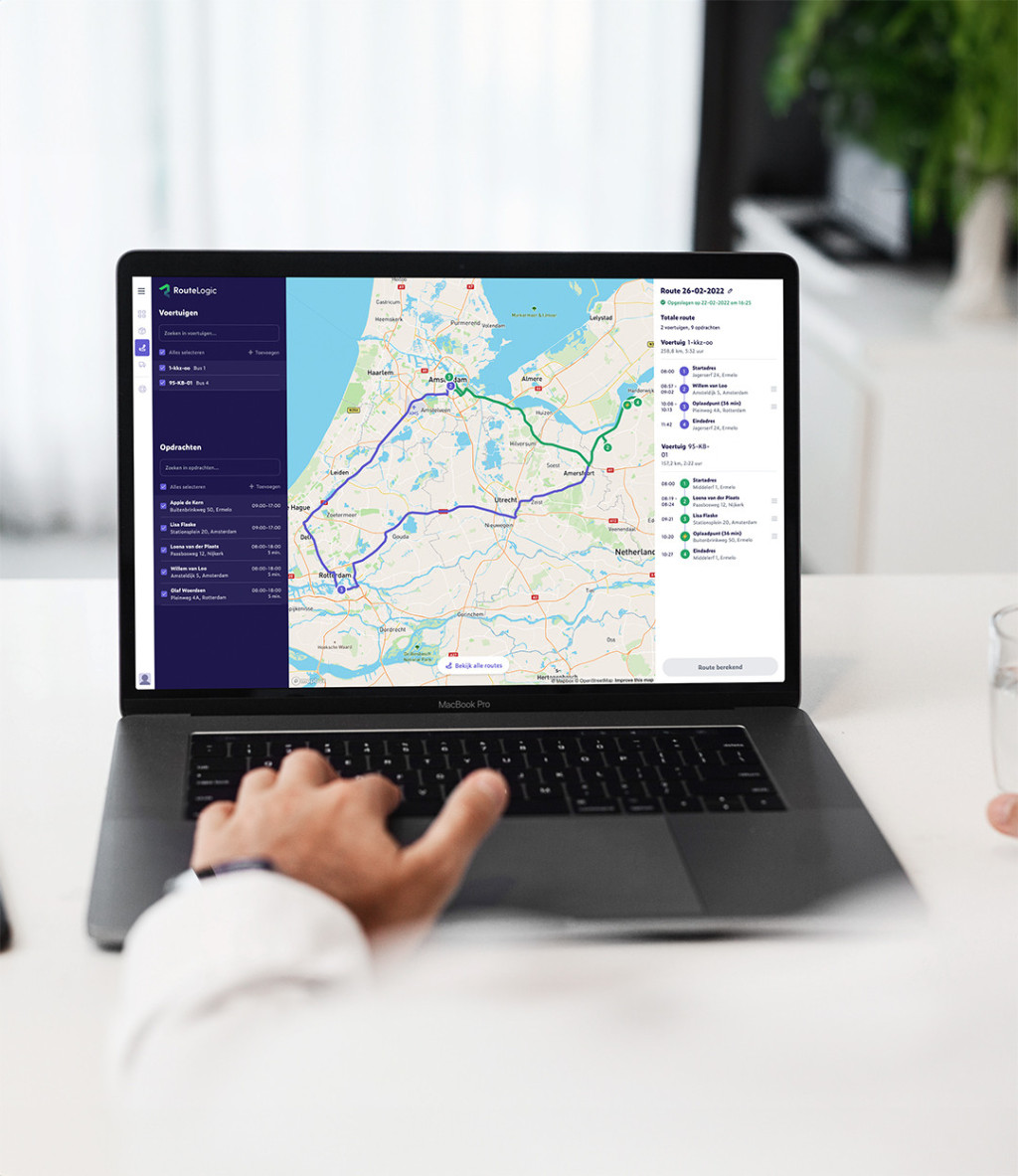What is logistics planning software?
Logistics planning software is a technological solution used to plan, manage and optimize logistics operations. This software covers a wide range of functions, including route planning, inventory management and resource allocation. It enables companies to streamline their logistics processes and save costs.
The evolution of logistics planning software
Logistics planning software has come a long way since the days of simple spreadsheets. Today, sophisticated, data-driven systems use real-time data to optimize logistics operations. This evolution has transformed the logistics industry and enabled companies to operate more efficiently.
RouteLogic
Key features and benefits
Route Planning and Optimization
One of the core functions of logistics planning software is route planning and optimization. This software calculates the most efficient routes for vehicles, taking into account factors such as traffic, distance, and load. The result is shorter routes, lower fuel costs, and reduced emissions.
Inventory Management and Warehouse Planning
Logistics planning software is also essential for inventory management and warehouse planning. It helps businesses maintain optimal inventory levels and minimize storage costs. This ensures a balanced inventory that meets demand without excessive stock.
Real-time Tracking and Monitoring
The ability to track and monitor logistics operations in real-time is another advantage of this software. Companies can track vehicles, goods, and assets and receive real-time updates on delivery progress. This insight is valuable for better decision-making.
Applications in Various Sectors
Transport and Distribution
In the transport and distribution sector, logistics planning software is vital. It optimizes the routes of trucks and couriers, saving costs and ensuring on-time deliveries. Whether it's package delivery or freight transport, this software is indispensable.
Retail and E-commerce
Retail and e-commerce heavily rely on logistics planning software. It enables retailers to manage inventory levels and streamline deliveries to customers. Customers expect fast and reliable deliveries to their door, and this software makes that possible.
Manufacturing and Supply Chain
In manufacturing companies, logistics planning software plays a crucial role in managing the supply chain and optimizing production flow. It minimizes delays and downtime in production processes, essential for efficient manufacturing.

Integration of Data and Technology
Data Sources and IoT Connectivity
Logistics planning software retrieves data from various sources, including traffic information, weather forecasts, and GPS data from vehicles. The Internet of Things (IoT) contributes to real-time data collection, improving data accuracy.
Artificial Intelligence and Predictive Analysis
Artificial intelligence and predictive analysis have significantly changed how businesses approach logistics planning. These advanced technologies enable organizations to more accurately predict future demand for products and services. By analyzing historical data and identifying patterns, AI can help anticipate fluctuations in demand, resulting in better inventory levels and fewer shortages or excesses.
Identifying Optimization Opportunities
AI and predictive analysis go beyond predicting demand. They can also help identify optimization opportunities in the logistics chain. This includes optimizing routes for transport, planning more efficient distribution centers, and reducing waiting times and costs. The potential to reduce costs and increase efficiency is significant, leading to a substantial improvement in profitability for businesses in various sectors.
Implementation and Challenges
Implementation Process
Implementing logistics planning software requires careful planning and adaptation to the specific needs of a business. This includes selecting the right software vendor and customizing the software to existing systems and workflows. One crucial aspect of successful implementation is training employees to use the new technology effectively and ensuring they understand the importance of following optimized processes.
Challenges and Considerations
While the benefits of logistics planning software are significant, businesses may face various challenges in its implementation. Costs can be an obstacle, especially for small and medium-sized enterprises. Additionally, data security is of utmost importance, given the sensitive nature of logistics data. Integration with existing systems can also be complex but is essential for seamless operation.

The Future of Logistics Planning Software
Innovation and Developments
The future of logistics planning software promises further innovation and development. A key development is increased automation within the supply chain, including the deployment of autonomous transport vehicles such as self-driving trucks and drones, improving efficiency and delivery speed.
Sustainability and Greener Options
A growing focus on sustainability in the logistics sector brings software into play as a means to promote greener options. Logistics planning software can help optimize routes to reduce fuel consumption and encourage the use of electric vehicles, significantly reducing the ecological footprint of logistics, which is beneficial for the environment.
A Revolution in Logistics Efficiency
Logistics planning software has proven to be a revolution in how businesses manage their supply chain. It provides the ability to predict future demand, identify optimization opportunities, and reduce costs. This technology has been invaluable in various sectors and is expected to continue growing in importance.
It is essential for companies to continue investing in logistics planning software and innovate to improve efficiency and save costs. By embracing the growing emphasis on sustainability and greener options, they can also contribute to a more environmentally friendly future for the logistics sector.
Logistics with Planning Software
As a company, now is the time to explore the benefits of logistics planning software and take advantage of improvements in your logistics operations. By investing in the right technology and taking the right steps during implementation, you can increase your competitive advantage, reduce costs, and improve customer satisfaction. The future of logistics efficiency is within reach, and it's up to you to stay ahead.
Managing your logistics with planning software is a crucial requirement. Not only does it save on fuel, but also time and money. Additionally, it emits less, which is good for the environment. RouteLogic considers for route calculation:
- The number of vehicles;
- How many hours a vehicle averages per day;
- How many kilometers a vehicle averages per day;
- How many hours you spend on route planning per day;
- The hourly wage of a driver;
- The fuel price per liter.
Start planning your first routes with RouteLogic for free now and discover how quickly you can create efficient routes for your own logistics operation.



